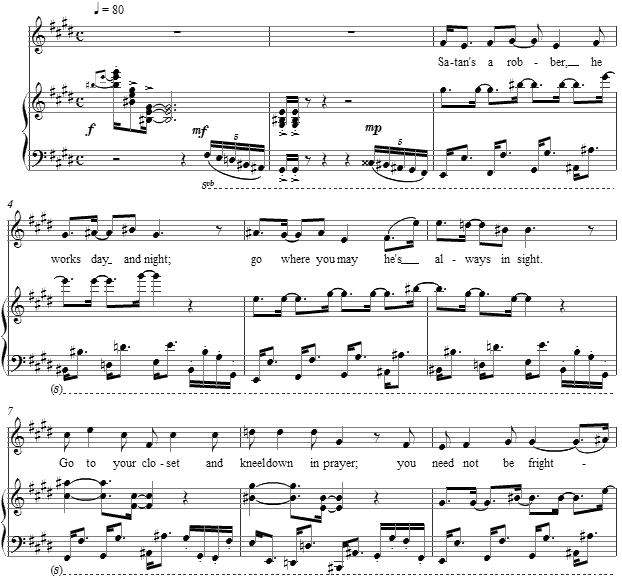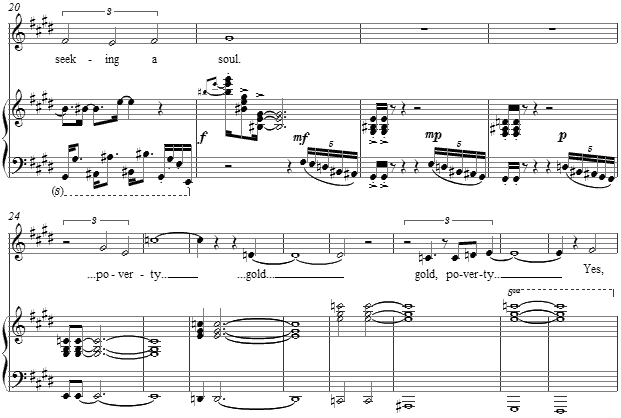Music and Texts of GARY BACHLUND
Vocal Music | Piano | Organ | Chamber Music | Orchestral | Articles and Commentary | Poems and Stories | Miscellany | FAQs
Satan - (2009)
James Ephraim McGirt
for medium voice and piano
Satan's a robber;
He works day and night;
Go where you may
He's always in sight.
Go to your closet
And kneel down in prayer;
You need not be frightened,
For Satan's not there.
He lurks around poverty;
He lurks around gold;
He's always on duty
Seeking a soul.[ 3 pages, circa 2' 25" ]
James McGirt
The text is found in McGirt's collection, Avenging the Maine, a drunken A.B., and other poems, Philadelphia, Penn: George F. Lasher, 1901. (A. B. refers to a drunken poet whom McGirt identifies circumspectly by only his initials.) The notion of Satan takes many forms throughout the ages and in men's many cultures, but notably it is a character in the many stories of mankind. [ 1 ] For McGirt, Satan is a robber, stealing innocence and uprightness.
The setting is rooted on the augmented triad, avoiding the oft-used tri-tone which so embodied the historical "devil in music." For the use of the augmented chord as source material, the whole tone scale comes along as one method of reaching this chord in linear motion. The snap rhythm of the bass line, as at measure 3, underpins the syncopation of the upper voices. A harmonic break from the insistence of the whole tone scale occurs as at measure 7 with the inclusion of a major triad on the supertonic before returning to the tonic augmented chord thereafter.
The setting breaks from its motoric insistence for a moment to note the environs in which "Satan" may so easily be found, by McGirt's observations: both in poverty and wealth. The modern meme suggests that relieving poverty is the antidote to the modern version of evil -- social injustice -- but this is merely a modern myth so often disproven by the reality of corruption and the corruptible amongst the wealthy, as amongst the poor.
The score for Satan is available as a free PDF download, though any major commercial performance or recording of the work is prohibited without prior arrangement with the composer. Click on the graphic below for this piano-vocal score.
NOTES
[ 1 ] Webster's New World Dictionary tells that the word evolves through Hebrew to Greek to Latin to old English, as well as other European languages, and means as a noun, "adversary," and as a verb phrase, "to be adverse, plot against." In the first meaning, WNW says "Judaism any of various celestial beings functioning as accuser or critic of humanity" and, in the second referring to Christian theology, the great enemy of humankind and of goodness; the Devil: usually identified with Lucifer, the chief of the fallen angels." Wiki deepens our linguistic understanding, adding, "Hebrew: השָׂטָן ha-Satan ("the accuser"); Arabic: الشيطان al-Shaitan ("the adversary") - both from an earlier Semitic root meaning "to be hostile" is an embodiment of antagonism...."
In Torah, the word is found twice, both times in the story-in-verse of Balaam's Ass, as found in Numbers 22, the section referred to as "Balak". This "angel of the Lord" is identified as an adversary or a physical block to Balaam's journey, as the text specifies, "But God was incensed at his going; so an angel of the Lord placed himself in his way as an adversary." Later in Numbers 22:32 the "angel of the Lord" specifically identifies himself by claiming to be like an adversary, again using the term satan: "It is I who came out as an adversary, for the errand is obnoxious to me." In I Chronicles 21:1, satan incites David to an unlawful census. The Talmud mentions the Satan in many places. In all of these places, the Satan is merely an agent of God, and has no independent existence. Specifically the supposed "Satan" of Job is identified by other words and subsumed under the expression, "sons of God." Moreover, within the Jewish telling, the word is found in the evening prayer, (Heb. הַשְׁכִּיבֵנוּ; "cause us to lie down"), which in the text reads, "...v'haser satan mil'faneinu u-me-achareinu" or "...and remove spiritual impediment from before us and from behind us."
In Christian scripture of coinè Greek, Satan occurs more than thirty times in passages alongside Diabolos (Greek for "the devil"), referring to the same person or thing as Satan, which becomes a character acting in the dramatic narrative in a different manner and more independently than the "angel of God" of Numbers as mentioned above. Christian liturgies sometimes speak openly of renouncing the "works of Satan" as a part of their worship. The Gospel of Luke presents a Satan which physically afflicts and possesses people, while the Gospel of John adds that Satan as a character in the biblical narrative as in men's lives is a murderer and a liar.
Islam too employs the narrative character of Satan, and the supposed temporary control taken by Satan over Muhammad as in the co-called Satanic verses is among the theological conundrums with which Muslim theology deals. The recent uproar over British writer, Salman Rushdie's 1988 book of this name, indicates the emotional furor which the subject still generates today. According to Islamic belief, Satan is not considered to be a fallen angel, but a "supernatural" jinn who was somehow among the ranks of angels due to his wisdom and piety, for angels always follow God's commands, but jinns (like humans) have free will, which explains why Satan was able to rebel against God's command as recorded in that version of the narrative. Some contemporary Islamic rhetoric announces that the United States and Israel are "satans," and yet by the understanding of the word informs us that, by opposite direction, this same Islamic rhetoric and those who employ it may also well be termed "satans" -- that is, adversaries or opponents.
In the Bahá'í Faith, Satan is not understood to be an independent yet evil persona, but rather as a symbol which speaks to the "base nature" of men. `Abdu'l-Bahá explains: "...the evil ego within us, not an evil personality outside."
I prefer the notion of contemporary "satanic" and evil impulses in mankind, citing Professor R. J. Rummel's foundational work, Death by Government, New Brunswick, N.J.: Transaction Publishers, 1994, in which he updates the horrors of the twentieth century with his notion of "Democide: The murder of any person or people by a government, including genocide, politicide, and mass murder." For me, this is the modern Satan, acting in such proven numbers -- 170 million deaths in the 20th century alone -- that any previous stories of a Satan pale by numerical comparison.
Professor Rummel notes, "democide is unambiguous. When under the command of higher authorities soldiers force villagers into a field and then machine gun them, there should be no question about definition. When a group armed by the government for this purpose turn the teachers and students out of their school, line up those of a particular tribe and shoot them, it is surely democide. When all food stuffs are systematically removed from a region by government authorities and a food blockade is put in place, the resulting deaths must be democide. Sad to say, most cases of government killing in this century is that clear. The number of deaths will be hazy for many of these cases; the perpetrators and intent will not."
Unlike the fumbling and foolish secular atheists of today for whom the concept of Satan and its underpinning in religions are baseless, one may rightly observe that Professor Rummel's undeniable statistics demonstrate that religion is not the only safe harbor for notions of Satan and satanic evil, but rather than the secular state has had an even more sadly productive time with the evil of a satanic democide than any single religion throughout history.
Therefore, the issue is not one of the sacred versus the profane per se, nor of religious versus secular, but that the evil inclination evidences itself in all cultures, religions and even secularism, being no respecter of the divisions of mankind into groups.


